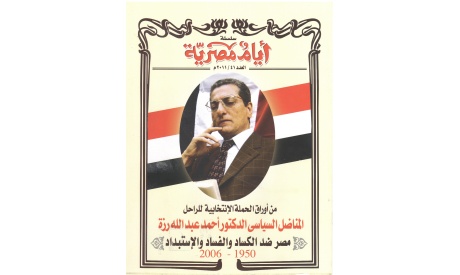
Ahmed Abdalla Rozza's election campaign documents from 2005
The editors of the periodical Egyptian Days consider them "non-regular historical accounts" and since its launch in 1990s it has published a number of issues with a unique historical style, largely dependent on rare photographs.
Good examples of this are the issue on King Fouad (the first Egyptian king in four centuries) and the issue on Cairo University.
This latest issue is a dedication to the memory of the late Ahmed Abdalla Rozza; one of the most notable figures of the 1972 student movement in Egypt.
Bearing in mind that the previous issue was on Tahrir Square, it is now clear that the periodical is on its way to reveal much of the previously untold, benefiting from the reduced restrictions currently exercised on freedom of expression.
Egyptian Days relied on one aspect of Ahmed Abdalla's life: the papers of his parliamentary election campaign in 2005. At the time, it was obvious that the laws and norms governing the election procedures rendered his success impossible, yet he insisted on campaigning on a purely political basis: his campaign represented the entire agenda of the national opposition seeking change at that time.
Ahmed Abdalla, for those who don't know him, was elected by Egyptian university students during their uprising in 1972 to head the Supreme National Committee that led the famous two-week sit-in during Sadat’s presidency. Their main issue was Sadat’s policies of "no war-no peace," as well as the continuous oppression of freedom.
Special Security Forces arrested the protestors, putting an end to the sit-in, forcing Abdalla to exile and estrangement. Upon Abdalla's return to Egypt, with a PhD in political science and no chance of engagement in any research or teaching body in the Egyptian system, he decided to reside in his birthplace, the densely populated neighbourhood of Ein El-Sira and to open there Al-Jeel Centre for Youth and Social Studies. His decision to work and spend his time with the people face-to-face is what led him, in the end, to run for parliament in 2005.
Egyptian Days chose to focus on documenting Abdalla's battles throughout his life. The periodical includes posters used during the campaign, flyers with campaign programmes and the campaign’s hand-written daily diary. Unfortunately, Egyptian Days only had records for 24 and 25 October. The 24 October report includes the details of Abdalla's visit to a number of places in Ein El-Sira and his conversations with people, including his history with some of them dating back to the early 1990s when he started his programme for working children.
It is interesting to note that Abdalla shared the concerns of people in the neighbourhood, but he insisted that solutions come from combined efforts; that he will work "with" them not "instead of" them.
The slogans and details of Abdalla's plans were included. Most interesting is that the demands he raised back then are in full alliance with January 25th Revolution demands: a new constitution, democratic system, right to form parties and coalitions, the removal of the state's control on security and media and finally: equality among all people. Although in the end he gained only a very small number of votes, it is nevertheless an interesting political battle in light of the times when elections were determined by money, connections and influence.
Abdalla is, indeed, worthy of the Egyptian Days’ dedication. He was, indubitably, among the inspirations of the January revolution and a mentor to many of its youth, though he didn’t live long enough to see the revolution on January 25, 2011. Abdalla passed away only few months after the 2005 elections.
Egyptian Days announced that the upcoming issue will be about the Aswan High Dam; something to look forward to.
Ayam Masreya (Egyptian days)
41st issue, Cairo: 2011
Short link: